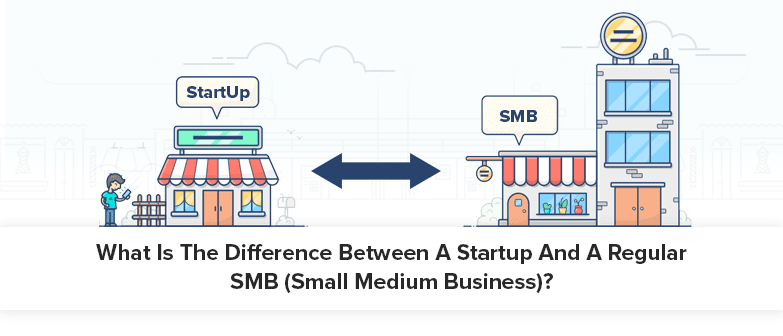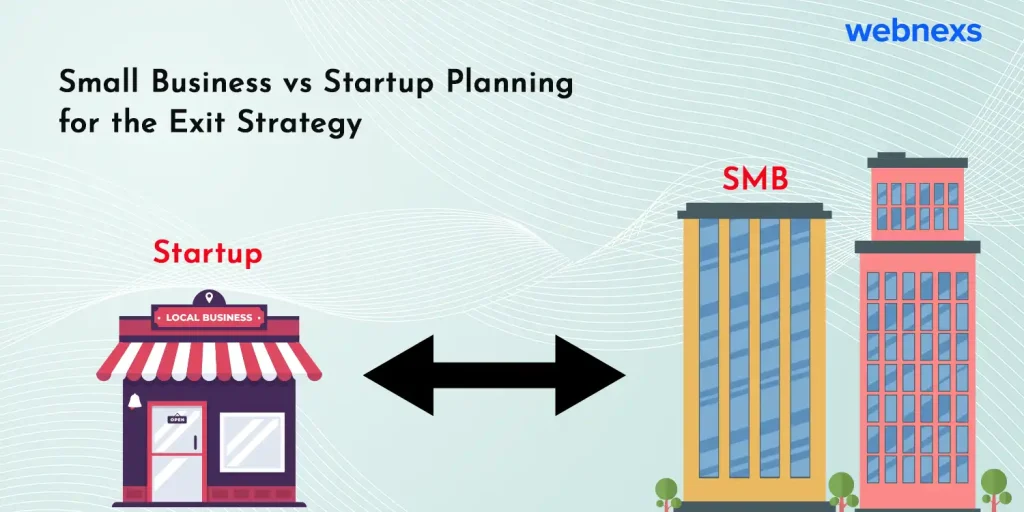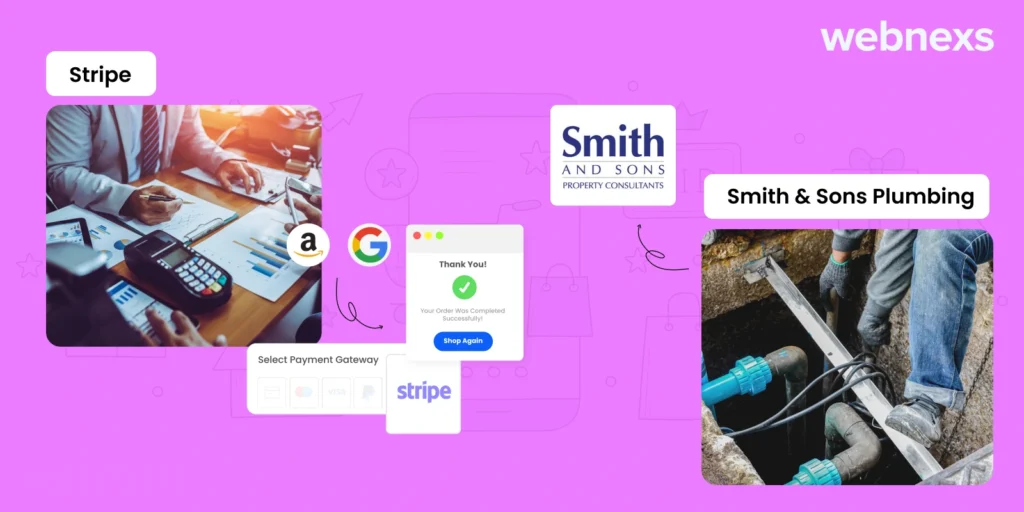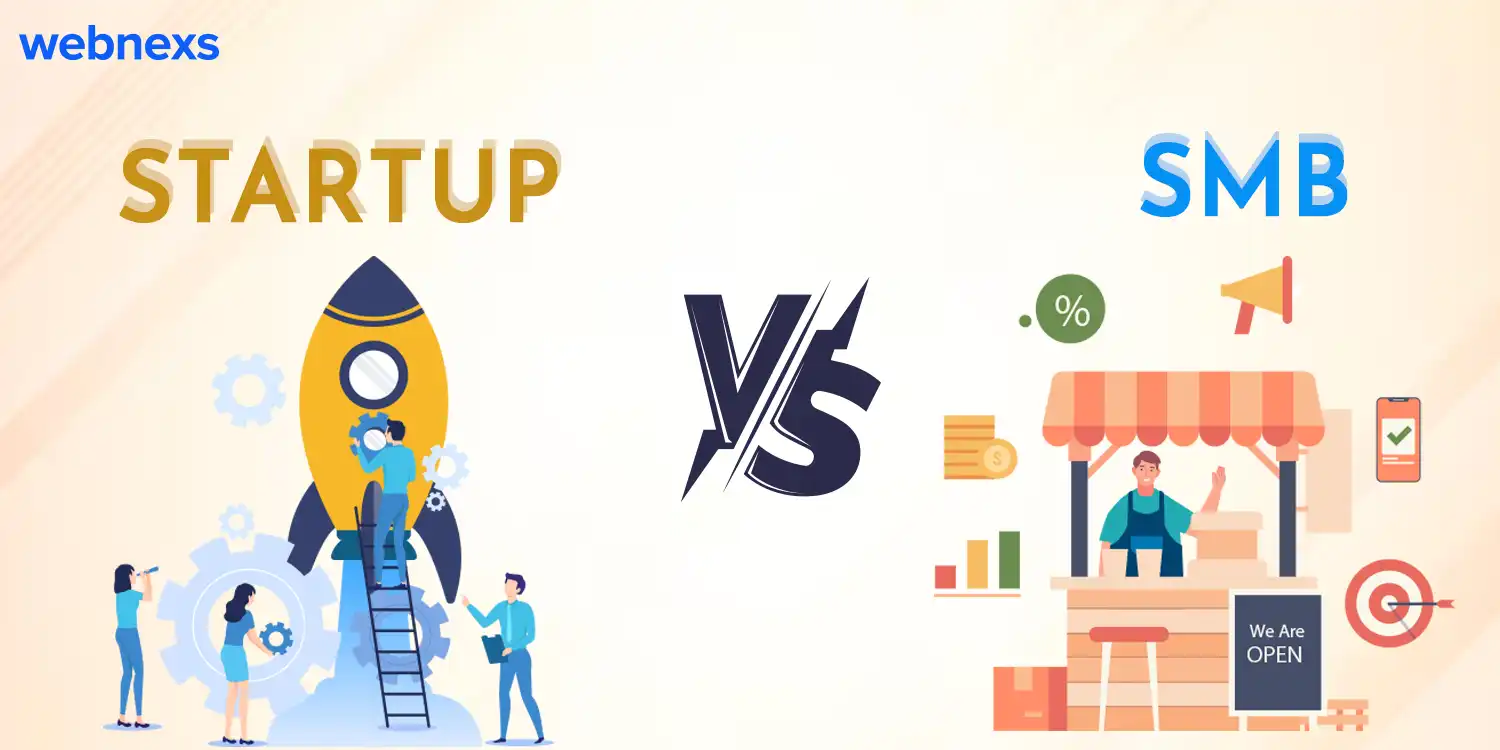The words SMB small business and startup are thrown around frequently, at times interchangeably.
Most budding entrepreneurs get confused between startup vs small business SMB.
Understanding the difference between a startup and small business is crucial—it can shape your entrepreneurial journey and help you choose the right path for your business idea.
Are you trying to determine whether your business idea aligns more with a startup or a small business model? Both models have the potential to support your business, but knowing which one fits your vision will set you up for success.
By the end of this blog, you’ll have a clearer understanding of the differences and be able to make an informed decision about the direction of your business.
Let’s look at how this blog helps you define your entrepreneurial path!
Key Takeaways on Startup vs Small Business
- Startups and small businesses have distinct characteristics and objectives.
- Startups are often technology-oriented with high growth potential within the tech industry, while SMB small medium business focus on stability and gradual growth.
- Funding mechanisms differ, with startups relying on venture capital from venture capitalists and SMB small medium business often seeking debt financing.
- Startups require clear exit strategies to satisfy investors, while SMB business have more flexibility in planning for the future and often focus on a stable market strategy.
- The biggest difference between startups and small business is their purpose. Smaller industries SMB business are driven by profitability, and sustainable long-term value whereas startup keeps focusing on initial revenue and growth potential.
Start up vs Small Business: Find the right path for your growth with our experts!
What is the Difference Between Startup and Small Business?
Startups aim for fast growth and big changes in the market, often looking for large investments. Small businesses, on the other hand, focus on stability, making a profit, and long-term success, usually with traditional funding. Startups grow quickly but take bigger risks, while small businesses grow slowly and try to avoid risks.
Regular Startup Vs Small Business (SMB): Differences To Know In 2025
When comparing startups and small businesses, it’s essential to recognize their fundamental differences in growth strategies, business goals, and risk levels.
Although both types of ventures aim for success, their approach and objectives often vary.
Below is a quick overview in the table, followed by a more detailed breakdown of these key differences:
| Aspect | Startup | Small Business |
| Growth Intent | Rapid expansion, aiming to disrupt industries | Steady, sustainable growth, serving a local or niche market |
| Business Goals | Innovate, capture market share quickly | Provide reliable service, focus on profitability and stability |
| End Goals | Scale quickly, get acquired, or go public | Long-term sustainability, potentially passed down to family |
| Funding | Equity financing (venture capital, angel investors) | Debt financing (loans, lines of credit) |
| Risk Levels | High-risk, untested market disruption | Lower risk, established markets with known customers |
What are the Differences Between a Startup and a Small Business?

1. Growth Intent
“The most defining difference between startups and small businesses is their approach to growth.”
Startups
– Startups are built with the primary goal of expanding rapidly and disrupting their industries.
– Founders of startups typically focus on creating innovative products or services that can scale quickly, making this business model particularly common in the tech sector, where growth can happen swiftly and on a large scale.
Small Businesses
– Small businesses are typically designed to serve a local or niche market.
– According to the Small Business Administration (SBA), a small business is an independently owned, for-profit organization that operates within a defined market space.
– Small businesses prioritize steady, sustainable growth without the pressure to scale as quickly as startups.
-Their focus is on delivering consistent value to a specific audience.
90% of startups want to grow fast and change industries, while 67% of small businesses focus on staying stable and lasting a long time.
2. Business Goals
“The objectives of startups and small businesses reflect their differing approaches to growth.”
Startups
– A startup aims to innovate and disrupt, often entering an entirely new market or creating a product that revolutionizes an industry’s operation.
– Their main goal is to grow fast, outperform competitors, and capture market share as quickly as possible.
Small Businesses
– Small businesses, in contrast, focus on serving their existing market effectively.
– They are not necessarily trying to disrupt the industry but rather to establish themselves as reliable and profitable within their local community or customer base.
– Businesses like restaurants, retail shops, and service providers may not aim for rapid expansion but instead focus on maintaining profitability and long-term stability.
80% of startups want to create new ideas and grow quickly, while more than 60% of small businesses focus on making steady money and keeping loyal customers.
3. End Goals
“Startups and small businesses also differ in their long-term objectives.”
Startups
– Startups are usually temporary organizations designed to test and refine a scalable business model.
– Once they find a successful model, they may either transition into a more structured company, get acquired by a larger organization, or go public through an Initial Public Offering (IPO).
Small Businesses
– Small businesses, on the other hand, are typically built to last over the long term.
– Many small business owners plan to run their business for years or even pass it down to family members.
– Their goal is to remain profitable and sustainable, continuing to serve their community or customer base for as long as possible.
65% of startups want to be bought or go public in 7-10 years. However, 52% of small businesses plan to stay independent and pass the business to family or workers.
4. Funding
“The methods of financing are another critical difference between startups and small businesses.”
Startups
– Startups often rely on equity financing, and seek venture capital from venture capitalists or angel investors. In return for funding, these investors typically receive a stake in the company.
– This method allows startups to access significant capital needed for rapid growth but often requires the founders to give up partial ownership of their company.
Small Businesses
– In contrast, small businesses usually opt for debt financing. They often rely on business loans, lines of credit, or other forms of traditional financing.
– Small business owners tend to avoid giving up equity, preferring to maintain full control of their operations.
– Their focus is on sustainable growth rather than rapid expansion, so the need for large amounts of capital is less pressing.
In 2021, startups got $450 billion in venture capital, mostly for tech. Small businesses mostly use bank loans or their savings, with 70% using these methods.
5. Risk Levels
“Startups and small businesses also face different levels of risk.”
Startups
– Launching a startup involves a higher degree of risk, as the business model is often untested and aimed at disrupting existing markets.
– Founders take a leap of faith, betting that their innovative product or service will succeed in gaining market traction.
– However, if the startup fails, the financial and operational risks can be significant.
Small Businesses
– While small businesses also face risks—such as 20% failing within their first year—the level of risk is generally lower than for startups.
– Small businesses usually enter well-established markets, providing familiar products or services to a known customer base.
– This reduces uncertainty and makes managing risk more straightforward, allowing small businesses to operate with greater stability.
75% of startup founders worry about money and market changes, while 20% of small businesses fail in their first year.
With these differences, entrepreneurs can make more informed decisions about which path to take—whether they aim to build a fast-growing startup or establish a stable, long-term small business.
So these are the differences between smb and startup. This is how both the business runs and thinks while working for their development.
Startup vs Small Business: Find the right path for your growth with our experts!
Now, let’s look at what an SMB and a startup are, along with their growth potential, funding, and exit strategies in the ecommerce industry, and explore what makes them different from each other in detail.
What is an SMB Business?

An SMB is usually described as a company with fewer than 1,000 employees. SMBs can also be characterized according to their annual revenue which is generally below $50 million.
SMBs are quite prevalent in number and constitute the majority of firms mainly found in developed countries.
For example, about 97% of businesses in Canada and 99% of businesses in Australia are small businesses, showing how important small businesses are in these countries.
Real-Life Business Wins
Joe’s Pizza wanted to make really good pizza and treat customers like family. Instead of growing quickly, they worked on being friends with people in the neighborhood. By making tasty pizza and earning trust, Joe’s Pizza showed that growing slowly can make a business last a long time.
The Growth and Potential of SMBs in the Ecommerce Industry

99.9% of businesses in the U.S. are small businesses, and they pay 44% of all private sector workers.
In the business world, the word ‘SMB’ goes ahead of a company just getting off the ground; but what is smb in business encompasses is much broader, covering a range of well-established small to medium-sized entities.
The term startup is also related to a business model that is normally technology-oriented and has high growth potential.
Initially, SMBs may face some personal struggles, particularly financial ones impacting operational costs and profit.
That is for the reason that investors are in search of the highest potential return on investment while matching the associated risks.
And one thing that you need to keep in mind is, “Not all technology companies have a very large market”.
To grow rapidly by knowing start up vs small business, you need to build something impressive that you can sell to a very big market.
Real-Life Business Wins
Books & Books made a cozy place where people who love books can meet, enjoy events, and find new books. They didn’t try to grow fast but instead focused on becoming a favorite spot in their neighborhood. By selling books and being friendly, Books & Books showed that small businesses can do well when they care about their customers.
Take Your Small Business to New Heights Today!
What is a Startup Business?

A startup is a newly established business organization. While technically all businesses begin as startups, the term most often refers to firms that aim at disrupting existing industries through new ideas or technologies.
Many startups focus on technological innovation about the provision of unique products/services.
For instance,
Some start-ups could develop unique applications for such services as food delivery or provide online alternatives for buying items like contact lenses.
These companies may start with one product but their ultimate objective is expansion by making available something different from what has been in existence before.
The fundamental difference between a startup and a small business is that a startup is related to a time (which was recently launched) whereas a Small Medium Business SMB is related to the measurement (such as the number of employees, and revenue).
Real-Life Business Wins
In 2008, three friends rented out air mattresses in their apartment to make extra money. This small idea grew into Airbnb, revolutionizing travel. With a $20 million investment, it expanded globally, proving big things can start small.
Learn More: Why Small Businesses Should Choose Multi-Vendor Platform?
How Do These Startup Entities Think About Growth In Ecommerce?

The global online shopping market is expected to reach $6.3 trillion by 2024, and startups will make up 38% of all online sales.
Startup differs from traditional businesses because they are designed to grow faster. By design, this means there is something scalable they can sell on the largest market. For most businesses, this is not the case.
Generally, a business does not require a large market to operate. You just need a market, and a proper ecommerce marketing plan on how to develop, and should be able to reach and serve all of those within your market.
Online merchants can go to a big market bypassing their time and space – customers come to buy things from you or use your products, regardless of wherever place you are in. The unique feature of most startups is that they are not controlled by these factors.
Real-Life Business Wins
In 2009, Uber had a simple idea: make it easy to get a ride. They used technology to change taxis and make getting a ride faster and easier. Uber didn’t just offer rides; they made a whole new system. With lots of money, they grew all over the world and changed how people travel.
Accelerate Your Startup’s Journey Today!
Relationship Between Funding in Startup and Small Business Industries

80% of startups get their first money from angel investors or venture capitalists, while only 30% of small businesses do.
Apart from having different ideas about “growth”, startups are looking for different financial investments than small business operations.
The startups depend on capital coming from investors or venture capitalists, and Small-Medium Business (SMB) activities may depend on debt and subsidies.
An interesting fact about venture capital is that it will have a more efficient role in any of the companies they provide.
While a small business provided with a loan may occasionally need to report back to its bank, a startup with backing will probably be getting a bit more help.
They will receive the investor’s advice if they are young and inexperienced, there is nothing better than help. This is true for those teams or individuals who will become part of an accelerator or insurance plan.
Small Business vs Startup Planning for the Exit Strategy

25% of startups get bought or go public to make money for investors. However, 65% of small business owners want to sell their business or give it to their family instead of going public.
Another thing you want to remember is your vision for your business on both start up vs small business.
If you get into venture capital financing without an exit strategy, you do not have the chance to get it.
Venture investors need an exit strategy because they want to increase their ROI.
If you want to run the company within 10 years, you would like to ensure that the exit plan comes in a fixed income stream format, allowing investors to pay, an IPO instead of buying out, or choosing a different strategy – your own financial or credit or subsidies, or government.
“Exit Strategy” development is not a problem for your own business, at least until you make it big or change your mind about owning the business.
The fact is, in a traditional business (not a start), you do not need an exit strategy at the beginning.
You will be fully responsible for your company’s future, whether you are running or not to sell or sell it to other parts of your life, to start or decide on the stock market, manage taxes, or you have to keep it down.
Real-life Examples of Startup and Small Business(SMB) to Inspire You

Stripe: Easy Payments for Everyone (Startup)
How They Did It: Stripe made payments simple for all businesses online. Companies like Amazon and Google use Stripe to get paid easily.
Key Insight: Sometimes the easiest ideas are the best. Stripe showed that simple solutions can work well.
Fuel for Growth: They raised $600 million to help grow their business and became worth $36 billion.
Smith & Sons Plumbing: Reliable and Always There (SMB)
How They Did It: Smith & Sons Plumbing became popular by giving good, trustworthy plumbing services to people in their community. They focus on doing something important—helping people with their plumbing needs.
Key Insight: Small businesses that focus on quality services, build trust and last a long time.
Fuel for Growth: Smith & Sons Plumbing used the money from their services and small loans for their growth. The trust built with their customers helped them to get loans.
Small Business vs Startup: Find the right path for your growth with our experts!
Final Thoughts
Finally, the startup vs small business debate has come to an end.
Startups aim to grow quickly and get bigger. But it needs money from investors to do big things. Small businesses grow slowly and steadily. They usually focus on serving local people or a specific group. Often, they use their own money to run the business.
It’s important to note that there’s no one-size-fits-all answer—your decision depends on your vision, resources, and long-term goals.
Now that you have a clearer understanding of these two paths, think about which model aligns with your business idea and your aspirations.
What’s your next step? Consider outlining your goals, evaluate your resources, and decide if you’re ready for the dynamic world of startups or if a solid, sustainable small business is a better fit.
If you have more questions or need help with this decision, feel free to reach out! What’s your vision for your business—growth or sustainability?






3 Responses
I found this post very helpful in understanding how startups and small businesses operate differently. Great insights for anyone looking to explore these business types!
Really clear breakdown of startups vs SMBs. I liked how the article made it easy to understand the key differences, especially for someone new to these terms.
This article does a great job explaining the difference between startups and small businesses. It helped me see how they have different goals and growth paths.